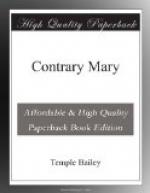So Mary’s arms were around her when she whispered to the child-wife that Barry was—dead.
Porter had faltered first something about an accident—that the doctors were—afraid.
Leila, shaking, had looked from one to the other. “I must go to him,” she had cried. “You see, I am his wife. I have a right to go.”
“His wife?” Of all things they had not expected this.
“Yes, we have been married a year—we ran away.”
“When, dear?”
“Last March—to Rockville—and—and we were going to tell everybody the next day—and then Barry lost his place—and we couldn’t.”
Oh, poor little widow, poor little child! Mary drew her close. “Leila, Leila,” she whispered, “dear little sister, dear little girl, we must love and comfort each other.”
And then Leila knew.
But they did not tell her how it had happened. The details of that last ride the woman who loved him need never know. Barry was to be her hero always.
CHAPTER XXIV
In Which Roger Comes Once More to the Tower Rooms; and in Which a Duel is Fought in Modern Fashion.
It was Cousin Patty who had suggested sending for Roger. “He can look after me, Mary. If you won’t let me go home, I don’t want you to have the thought of me to burden you.”
“You couldn’t be a burden. And I don’t know what Aunt Isabelle and I should have done without you.”
She began to cry weakly, and Cousin Patty, comforting her, said in her heart, “There is no one but Roger who can say the right things to her.”
As yet no one had said the right things. It seemed to Mary that she carried a wound too deep for healing. Gordon had softened the truth as much as possible, but he could not hide it from her. She knew that Barry, her boy Barry, had gone out of the world defeated.
It was Roger who helped her.
He came first upon her as she sat alone in the garden by the fountain. It was a sultry spring day, and heavy clouds hung low on the horizon. Thin and frail in her black frock, she rose to meet him, the ghost of the girl who had once bloomed like a flower in her scarlet wrap.
Roger took her hands in his.
“You poor little child,” he said; “you poor little child.”
She did not cry. She simply looked up at him, frozen-white. “Oh, it wasn’t fair for him to go—that way. He tried so hard. He tried so hard.”
“I know. And it was a great fight he put up, you must remember that.”
“But to fail—at the last.”
“You mustn’t think of that. Somehow I can see Barry still fighting, and winning. One of a glorious company.”
“A glorious company—Barry?”
“Yes. Why not? We are judged by the fight we make, not by our victory.”
She drew a long breath. “Everybody else has been sorry. Nobody else could seem to understand.”




